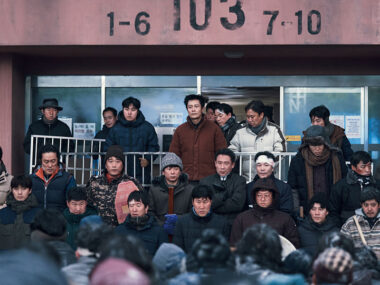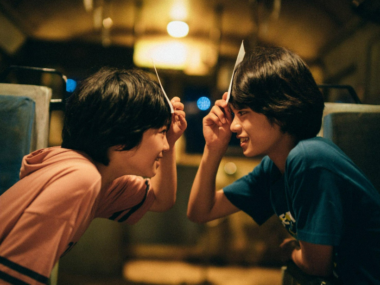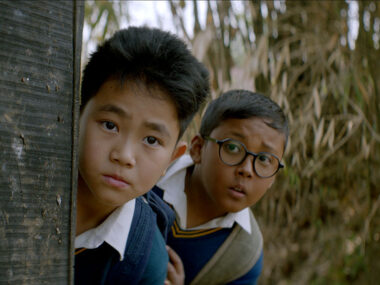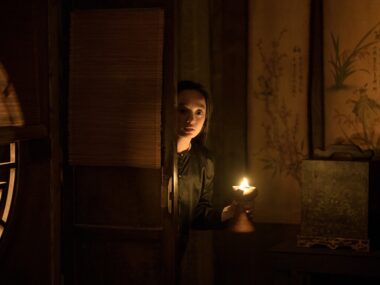In a powerful fusion of vision, emerging young directorial duo of Jeffrey Lam Sen and Antonio Tam embarked on a project inspired by the biblical phrase The Valley of the Shadow of Death. The title in Chinese translates to “unforgivable sin.” A haunting metaphor for navigating the treacherous landscapes of mortality and hardship, it speaks to the heart of fear, uncertainty, and the feeling of being swallowed by darkness. This hypothetical valley is a place where danger looms, despair reigns, and one’s soul might tremble in solitude. Yet, it also conveys the message that, even in such darkness, there is no need for fear, as God’s presence offers comfort and guidance.
Pastor Leung (Anthony Wong), a man who has spent his life preaching the power of forgiveness, finds his own convictions put to the ultimate test when a church member offers refuge to a young homeless man, Ah Lok (George Au). He initially encounters this man—handcuffed and escorted by police—while visiting his grandmother on her deathbed at the hospital administered by the pastor.
As the story unfolds through a series of poignant flashbacks, Leung discovers that this boy is truly familiar for a reason– he is responsible for the tragic death of his daughter, Leung Sze Ching aka Ching Ching (Sheena Chan), a classmate of the young man, and the root cause of the ongoing strain between him and his wife, a dedicated head nurse (Louisa So).

Caught in a storm of emotions, Leung is torn between his desire for justice, his wife’s fury at his choice to help the very person who destroyed their family, and his own sacred duty as a pastor to live by the teachings he so passionately preaches. With his faith, his marriage, and his sense of self all on the line, Leung is thrust into a maelstrom of moral conflict and unrelenting pressure.
Unbeknownst to Ah Lok, he places his complete trust and faith in the pastor, seeking redemption for his unforgivable sins and hoping to erase his past as an ex-convict. The film thrives on stark contrasts—crime and punishment, memory and reality, faith and science—all woven together with the thread of betrayal. There’s a pivotal moment when Ah Lok discovers that the pastor has known who he truly is all along. What he thought was a safe haven—a guiding hand in the dark—suddenly unravels. The revelation of Leung’s awareness doesn’t just shake him; it wounds him with a profound sense of betrayal.
If you think about it, would you ever be able to forgive someone who assaulted someone close to you, which eventually led to the victim resorting to suicide? The answer is almost certainly a firm “No”. And most likely, nobody would even try to. But people expect flawless victims, and if they resist the message that this movie delivers, maybe it challenges them to reflect on why they are placing blame on the victim.
Pastor Leung makes Ah Lok learn the holy book and literally carry a cross across a hill in one scene. The naivety of Ah Lok, combined with his desperation to escape his past sins and redeem himself, is almost disturbing to watch. The winning moment was when the pastor confirmed that God had forgiven Ah Lok’s sins, and he responds by saying that he forgives the pastor’s daughter too! Get this– that’s the moment you realize a rapist can have the audacity to forgive his victim—a concept that’s utterly absurd, but in this context makes you think.
As anticipated, the tension simmers until it erupts into a fiery crescendo, reaching its peak in a powerful, genre-defying baptism scene. It’s a moment that doesn’t just echo—but fully embodies—the haunting metaphor of the film’s title, The Valley of the Shadow of Death.
Thanks to Anthony Wong’s convincing performance as Pastor Leung, this movie manages to maintain the pace. He delivers a performance that is nothing less than outstanding—fully in line with his esteemed reputation as a veteran actor in the Hong Kong film industry. In his film debut, George Au brings a quiet intensity to Ah Lok—a character clinging to even the faintest glimmer of redemption with wide-eyed desperation. His portrayal captures the fragile hope of a young man aching for forgiveness, making every hesitant smile and broken gesture feel achingly real.

The complicated teenage relationship between Ah Lok and Ching Ching, portrayed through glimpses of the past, including the events leading to the assault and the dire consequences of the assault, forms a compelling foundation that enhances the film’s emotional grip on the audience.
If you believe that everyone deserves a second chance, go ahead and watch this one.
| Release Date: 2024-10-31 (Tokyo International Film Festival) 2025-07-13 (NYAFF) | Distributor(s): Golden Scene |
| Cast: Anthony Wong, Louisa So, George Au, Sheena Chan, Summer Chan | Producer: Jacqueline Liu Yuen-Hung |
| Directors: Jeffrey Sen Lam, Antonio Tam | Cinematography: Wong Shek-keung Leo |
| Runtime: 84 Minutes | Genres: Drama |











